Dogs descended from wolves, and deep within the psyche of your dog lies instincts it has retained from its wild ancestors. In order to live with and communicate with your dog you need to understand why you must maintain alpha position in the "pack."
Your dog depends on you for its survival. It has learned that it must cooperate with you through thousands of years of evolution and adaptation in human society. The first domestication by man was the wolf. About twelve thousand years ago we discovered that having a wolf as a "pet" was a great asset. They could hunt alongside us and guard us as we slept.
As the years went by, the wolf began to mutate into different breeds. Scientists are unsure exactly how the first breeds developed. There are several different theories that include natural mutations, climate and environment. The breeds became more numerous and more specialized. That is how we ended up with groups such as herding, hunting, shepherding, guarding, and of course, companion and lap dogs.
Of all the animals that we have domesticated, only the dog has willingly allowed itself to accept the authority of man without constraint. But as I said, it still retains the instinct to test its position. Yes, even sweet little Lady, the Maltese lying at your feet, has the genes and instincts of the wolf.
Wolves live by rules and have a social structure. The entire pack cooperates under a single leader. Lines are clearly defined. The leader of the pack eats first, and then the rest of the pack can eat. When your dog growls at you when he is eating, he is saying, "I am the leader and you must wait."
If your dog has a growling problem, here are some "rules to live by" that may be of help to you.
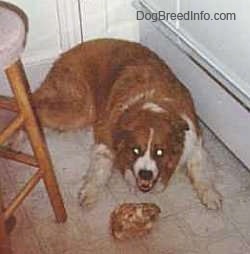
1. Never tolerate growling. This is a threat and it means your dog sees you as a subordinate meant to be dominated by him. Tell him “no!” Let him know it is not acceptable to EVER growl at you or your children. Make it clear that your children are the offspring of his alpha leader (you) and that they are to be treated as alpha "pups."
2. Do not let your dog walk through the door first. If your dog always goes ahead of you, you need to get your leash and open the door. When he rushes ahead you pull him back and tell him, "no. Wait." You walk in first and then give him permission to come in. This will be easier and faster if you have someone help you.
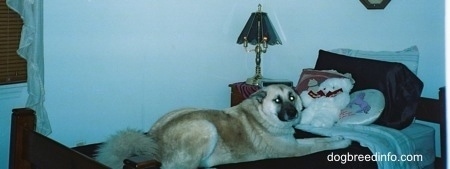
3. Do not let a dog that is having alpha issues sleep in the same bed as the humans. This is a definite alpha position. A doggie bed on the floor beside you is your best bet for maintaining alpha position. This rule is for aggressive dogs or dogs showing signs they are forgetting their place. A pet that is well-behaved and obedient can sleep next to you or your child, so long as it was the humans that invited the dog up. The dog should not be the one deciding to jump up on the bed. If you just can't be without your dog in the bed, at the very least you need to make sure he sleeps at the foot of the bed and not on your pillow.
4. Socialize, socialize, socialize. I cannot stress enough the importance of introducing your dog to different places and people. Find something to do with your dog. Join an agility or obedience class. Take your dog to the park. If you have a laid-back dog or puppy, share your time with the local nursing home. Volunteer with disability groups so children and adults with special needs can enjoy the non-judgmental love a dog or puppy can provide.
5. Do not let your dog ride in your lap in the car; it is unsafe for you and your dog. Some states will give you a ticket for being a distracted driver. Make him sit in his own seat or on the floor. Buy him his own seat belt or safety booster or use a kennel.
6. Do not baby your dog. He needs to learn to be a dog. Do not over-protect him. He needs to explore and learn to be independent. You do not want to raise a flighty, paranoid dog. When he acts afraid of something that he should not be afraid of, do not pick him up and ooh and ahh over him. Simply tell him it is okay by calmly showing him the object, person, etc. Your confidence will make him a confident and dependable dog. If you feed his imaginary fears, he will become a snappy and untrustworthy dog. He may develop fear aggression.
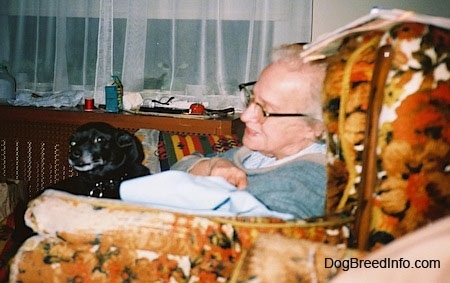
An example of fear aggression could be a dog that sits in its owner's lap and growls at people or other animals. If you pet him and tell him, "it's okay," you are really telling him this is the type of behavior you expect of him, and he will continue to do it because there is a reward attached to it. Tell him “no” and make him get down off your lap. While some owners think it is sweet that their little lap dog is "protecting them," this is not the case. When a child reaches to pet the dog or hug Grandma it could bite them if it is allowed to get away with this antisocial behavior. This is a dog that has taken on alpha position and you are a subordinate. I have seen so many children chastised when they get bitten, when it's the owner that is responsible. You will often hear people say "Now, you know Granny's dog doesn't like you to go near her. She is jealous, and protective. We have told you over and over not to do that." What a shame. And it could all be avoided if we would just take the time to learn canine behavior. As much as we would like to believe that they think like us, they do not.
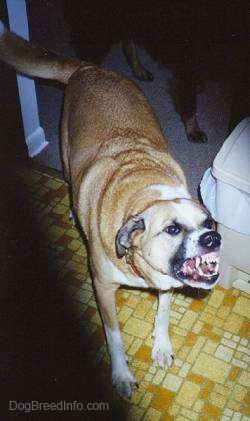
If you have a problem with your dog growling at you or another family member, you may want to try having the person your dog growls at the most be the only one to feed him. You want to make him sit to reinforce your position as the leader. He is learning that he depends on you and he must obey in order to eat. And if he growls after you set down the food, tell him “no” and take the food away. Tell him to sit again. This is how you will reinforce the "no-growling rule.''
You must never tolerate growling because this will usually lead to biting. Not always, but it usually does. So you need to nip it in the bud as soon as possible. I want to make it clear we are not talking about puppy play growling, only growling that is geared towards aggression. Puppies need to be able to be puppies.
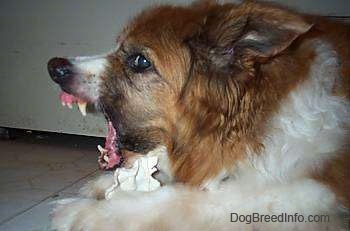
Do not play tug-of-war with a puppy. Play fetch and tell it to release the ball. Never be overly harsh with your dog. Use common sense.
When a dog is constantly leaning on you, putting his paw on you, or touching you in some way, this is not your dog loving you, it is your dog displaying dominant behaviors. In the dog world, space is respect. A dog that is constantly nudging you and leaning on you is not only disrespecting you, it is being the alpha dog. You are the one who must start and end touching and affection. Affection should only be given when the dog is being calm and submissive, never when the dog is excited, anxious, scared, nervous, etc., or you will be reinforcing that state in the dog.
One last thing... spend time with your dog. Train him. Walk him daily. Be calm, assertive and provide rules and boundaries your dog must follow. When you provide all of those things, play with him and love him. Just as a child looks to his parents for guidance and boundaries, so does your dog. Sometimes we have to use tough love, but in the long run, you and your dog will be happier if you maintain the alpha role.
Written by Dawn Littlefield, edited by Dog Breed Info Center© Dog Breed Info Center® All Rights Reserved